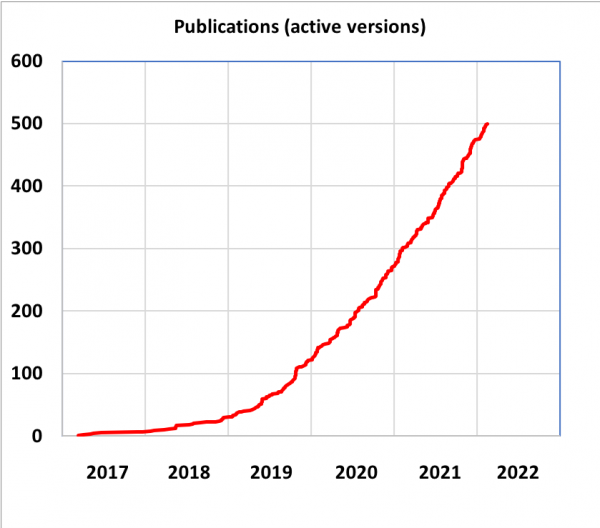Materials Cloud repository hits milestone 500 published record mark
By Carey Sargent, EPFL, NCCR MARVEL
Publications to the Materials Cloud Archive, an open repository for research data that has been recommended by entities including the EU Commission and the Swiss National Science Foundation, have reached the 500-mark with the entry of data on simulated critical temperatures of the magnetic phase transition for experimentally reported Heusler and Heusler-like materials.
"Having curated data that can be shared is central to the values of open science and reproducibility,” said Nicola Marzari, a Materials Cloud project leader and head of the National Centre for Competence in Research (NCCR) MARVEL. “We are delighted to see how the community recognizes this. The first 100 records in the Archive took 20 months, and the last 100 only 5 months, with new submissions every day now."
In addition to being a repository suggested by the EU Commission for materials science through Open Research Europe, and by the SNSF, the Materials Cloud archive is in partnership for the long-term storage of battery data with Battery Interface Genome – Materials Acceleration Platform (BIG-MAP). The project is part of the large-scale, long-term European research initiative BATTERY 2030+, aimed at inventing the sustainable batteries of the future.

“We are reusing the same technology to develop a similar archive infrastructure with BIG-MAP, to facilitate exchange of experimental and simulation data that can then be automatically discovered and used to train novel machine-learning algorithms" said Giovanni Pizzi, Materials Cloud team leader and staff scientist at Theory and Simulation of Materials, EPFL. “They will in turn help us in designing and discovering new batteries much faster than we can today”.
More generally, the Materials Cloud archive underpins the reproduction of results discussed in scientific publications. In addition to acknowledgement from the EU Commission and the SNSF, the archive has been recommended as a repository for articles published in Nature Research’s Scientific Data, is indexed by the Google Dataset Search and is an active implementation network of the GO FAIR initiative. Materials Cloud is supported by NCCR MARVEL, EPFL, and the European H2020 MaX project. Other research partners include the European H2020 NFFA, EMMC, and MarketPlace projects, as well as the supercomputing centers CSCS, CINECA, and Forschungszentrum Jülich.
The archive first went online in 2018 and developers have since integrated numerous new computational tools and sections containing curated data sets. The archive underwent a major reengineering in 2020, improving the user experience, accommodating the growing number of submissions and helping moderators and developers focus on the core work of the archive—enabling the seamless sharing and dissemination of resources in computational materials science.
Submissions to the Materials Cloud Archive are expected to be of interest and value to the field. Upon publication, they receive persistent DOIs and a guaranteed lifetime of at least 10 years from publication. Submissions are open from anyone in the world when contributed results are associated with a paper on computational materials science. Experimental works are currently accepted from authors affiliated with Materials Cloud partners, or when the work relates to published computational results, e.g., confirming or disproving them.
For any questions, please consult the Materials Cloud Archive’s FAQs or contact the Materials Cloud team at archive@materialscloud.org.
Low-volume newsletters, targeted to the scientific and industrial communities.
Subscribe to our newsletter